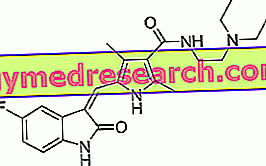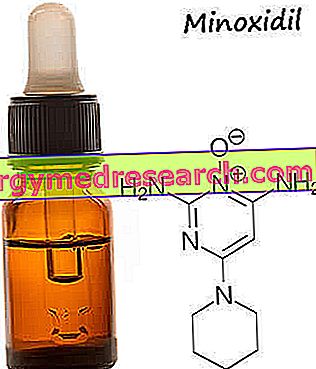Sunitinib is an anticancer medicine that can inhibit the growth of malignant cells. It is sold under the trade name Sutent®.

Sunitinib - Chemical Structure
Indications
For what it uses
The use of sunitinib is indicated for the treatment of the following diseases:
- Stromal tumor of the gastrointestinal tract (GIST) in cases where therapy with imatinib (another anticancer medicine) no longer has effect or cannot be administered;
- Metastatic renal cell carcinoma;
- Pancreatic neuroendocrine tumors (ie tumors of pancreatic cells that produce hormones).
Warnings
Sunitinib can only be prescribed to patients by a doctor who specializes in the use of anticancer medicines.
Sunitinib can cause an increase in blood pressure, so it is necessary to monitor the pressure throughout the treatment. In some cases, drug treatment may be required.
Because sunitinib can cause abnormal heart rhythms, your doctor may decide to have patients check your electrocardiogram regularly.
Thyroid function may be reduced by taking sunitinib, so checks must be performed to verify thyroid function, both before and during treatment with the drug.
Since sunitinib can cause liver damage, liver function tests should be performed, both before and during treatment with the drug.
During the entire period of treatment with sunitinib, renal function checks should be performed.
Sunitinib can affect wound healing ability, so treatment should be discontinued in patients undergoing surgery.
Before starting treatment with sunitinib it is advisable to perform dental checks.
In diabetic patients - on sunitinib therapy - it is necessary to regularly monitor the glycemic level and - if necessary - adjust the dose of diabetes medications so as to prevent blood sugar levels from falling too low.
Sunitinib should not be used in patients under 18 years of age.
Sunitinib could cause side effects that could affect the ability to drive and / or operate machinery.
Interactions
The concomitant administration of sunitinib and cytochrome P3A4 inducing drugs should be avoided. In fact, these drugs are able to reduce the plasma concentration of sunitinib. Among these drugs, we recall:
- Rifampicin, an antibiotic;
- Dexamethasone, a corticosteroid;
- Phenytoin, carbamazepine and phenobarbital, drugs used in the treatment of epilepsy;
- Preparations based on St. John's wort (or St. John's wort), a plant that has antidepressant properties.
The concomitant administration of sunitinib and inhibitors of cytochrome P3A4 should also be avoided. Among these inhibitors we find:
- Ketoconazole and itraconazole, antifungal drugs;
- Ritonavir, an antiviral drug used to treat HIV;
- Erythromycin and clarithromycin, drugs with antibiotic action;
- Grapefruit and its derivatives.
These drugs, in fact, are able to increase the plasma concentration of sunitinib, thus generating potentially dangerous effects.
Side effects
Sunitinib can induce various types of side effects although not all patients experience them. This depends on each individual's sensitivity to the drug. Therefore it is not said that all adverse effects occur with the same intensity in each patient.
The following are the main side effects that may occur following treatment with sunitinib.
Cardiovascular disorders
Sunitinib therapy may cause:
- Cardiomyopathy;
- Cardiac rhythm disorders;
- Heart attack;
- Reduction in the amount of blood pumped from the heart to the body;
- Pericardial effusion;
- Hypertension;
- Insufficient blood supply to the heart due to obstruction or constriction of the coronaries;
- Blood clot formation;
- Stroke.
Temporary reduction in blood cell production
Treatment with sunitinib may cause a temporary decrease in blood cell production. This reduction may cause:
- Anemia (reduced amount of hemoglobin in the blood);
- Leukopenia (reduced number of white blood cells) with consequent increased susceptibility to contraction of infections, even serious ones;
- Plateletopenia (reduced number of platelets) with increased risk of bleeding and bleeding.
Nervous system disorders
Sunitinib therapy can cause excessive tiredness, dizziness, headache and difficulty sleeping.
Psychiatric disorders
Treatment with sunitinib can cause insomnia and depression.
Hepatobiliary disorders
Sunitinib therapy may cause changes in the levels of liver enzymes in the bloodstream, liver failure, hepatitis, jaundice and inflammation of the gallbladder with or without stones.
Gastrointestinal disorders
Treatment with sunitinib may cause:
- Nausea and vomit;
- Diarrhea;
- Constipation;
- Abdominal pain or swelling;
- Inflammation of the digestive tract;
- Excess gas in the stomach and intestines;
- Stomach ache;
- Pancreatitis;
- Tumor destruction that causes perforation of the intestine.
Lung and respiratory tract disorders
Sunitinib therapy can cause shortness of breath, cough, fluid retention around the lungs, nasal dryness and nasal congestion.
Renal and urinary tract disorders
Treatment with sunitinib may cause changes in urine color, altered urination frequency, absence of urination, renal insufficiency and proteinuria (presence of protein in the urine).
Skin and skin tissue disorders
Sunitinib therapy can cause discolouration or hyperpigmentation of the skin, alteration of hair color, rash, skin rash, dryness, peeling, itching, blisters, acne, changes in skin sensitivity, hair loss, alteration and loss of nails.
Furthermore, more severe skin reactions may occur, such as Stevens-Johnson syndrome (a more severe variant of polymorphic erythema), erythema multiforme, and toxic epidermal necrolysis.
Endocrine disorders
Treatment with sunitinib may cause hypothyroidism, but may also result in increased thyroid hormone production. This increase leads to an increase in metabolism.
Furthermore, the drug can cause inflammation of the thyroid.
Tumor lysis syndrome (TLS)
This syndrome is caused by the release into the bloodstream of intracellular products resulting from the mass lysis of tumor cells. The symptoms that can occur are:
- Nausea;
- Heart rate changes;
- Shortness of breath;
- Muscle cramps;
- Convulsions;
- Changes in renal function;
- Acute renal failure.
Other side effects
Other side effects that may occur during sunitinib therapy are:
- Allergic reactions in sensitive subjects;
- Lowering of the glycemic rate;
- Pain, soreness, inflammation or dryness of the mouth;
- Alterations in the sense of taste;
- Difficulty or inability to swallow;
- Loss of appetite;
- Nose blood;
- Muscle and joint pain;
- Temperature;
- Influenza syndrome;
- Hyperuricemia;
- Increased blood concentration of creatine phosphokinase;
- Dehydration;
- Soft tissue infections;
- Fistulas, that is the abnormal tubular connection between internal organs and skin or other tissues that normally are not connected to each other;
- Rhabdomyolysis, that is the rupture of the cells that make up the skeletal muscle, with consequent release in the blood circulation of the substances contained in the musculature.
Overdose
If you suspect you have taken an overdose of medication, you must contact your doctor immediately or contact the nearest hospital.
There is no specific antidote for sunitinib overdose. To eliminate the drug not absorbed by the body, it could be useful to perform a gastric lavage.
Action mechanism
Sunitinib has its therapeutic action by inhibiting multiple tyrosine kinase (RTK) receptors. The tyrosine kinases on which sunitinib acts are particular proteins expressed on the membrane of malignant cells that are involved in growth, in neoangiogenesis (construction of a vascular network necessary for nourishment of the tumor mass) and in the metastatic progression of cancer.
In particular, sunitinib is able to inhibit:
- Platelet-derived growth factor receptors (PDGFRα and PDGFRβ);
- Receptors of vascular endothelial growth factor (VEGFR1, VEGFR2 and VEGFR3);
- The stem cell factor receptor (KIT);
- The tyrosine kinase receptor FLT3;
- The CSF-1R (colony stimulating factor receptor) receptor;
- The receptor of the glial-derived neutrophic factor (RET).
Mode of Use - Posology
Sunitinib is available for oral administration as hard capsules. The capsules may have a different color depending on the amount of active ingredient they contain.
The capsules can be taken either on a full stomach or on an empty stomach.
The dosage of sunitinib must be established by the doctor according to the pathology to be treated and according to the clinical condition of the patient.
Below are the doses of the drug normally used.
Stromal tumor of the gastrointestinal tract and metastatic renal cell carcinoma
For the treatment of this type of cancer, the usual dose of sunitinib given is 50 mg once a day, to be taken for 28 days. The following 14 days constitute a break period in which the drug should not be taken.
The duration of treatment must be decided by the doctor.
Pancreatic neuroendocrine tumors
For the treatment of this type of cancer, the usual dose of sunitinib is 37.5 mg once a day, without the pause period. Again, the duration of therapy is decided by the doctor.
Pregnancy and breastfeeding
Animal studies have shown that sunitinib can induce fetal malformations. Therefore, the drug should not be used by pregnant women, except in the case where the doctor does not consider it absolutely essential and in the event that the expected benefits for the mother justify the potential risks to the fetus.
It is, however, necessary to adopt contraceptive methods to avoid the onset of possible pregnancies.
Because sunitinib is excreted in breast milk, breastfeeding mothers should not take the medicine.
Contraindications
The use of sunitinib is contraindicated in the following cases:
- Known hypersensitivity to sunitinib;
- In patients under 18 years of age;
- During breastfeeding.



